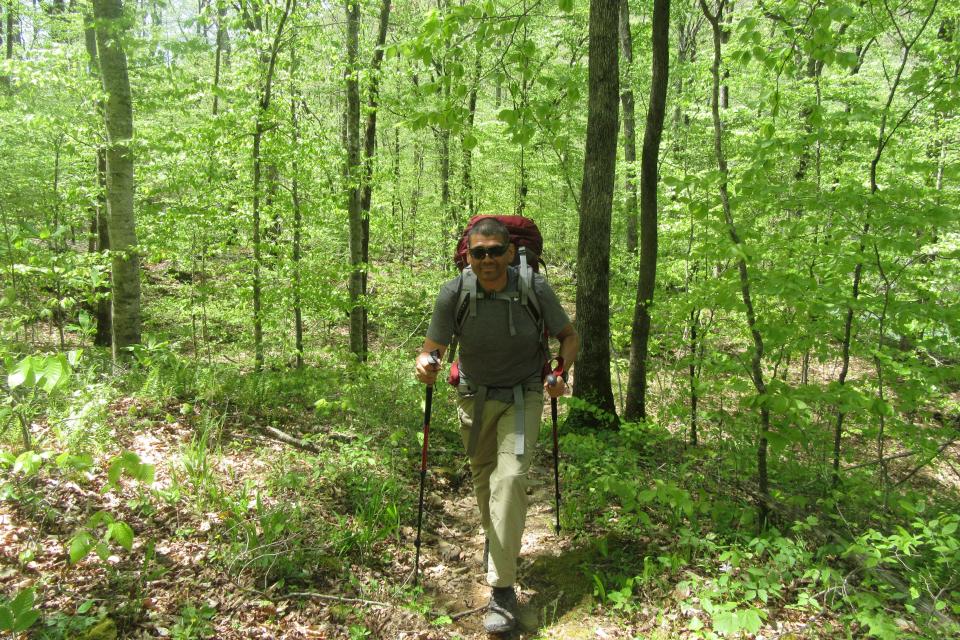Man who allegedly killed war veteran on Appalachian Trail deemed mentally incompetent

The man accused of brutally killing an Iraq War veteran hiking a remote section of the Appalachian Trail in May has been deemed mentally incompetent and ordered to undergo mental-health treatment so he can be prosecuted.
A federal magistrate judge ordered Wednesday morning James L. Jordan of West Yarmouth, Massachusetts, detained indefinitely until he’s treated and is competent to understand the murder charges against him.
Prosecutors say Jordan was armed with a large knife or machete when he attacked several hikers in Smyth County, Virginia on May 11, fatally stabbing Army veteran Ronald Sanchez, Jr., 43, and wounding a woman who then hiked six miles while bleeding to get help. Several other hikers had in the weeks before the incident flagged Jordan's behavior as unusual, and he was briefly detained on a different section of the 2,200-mile-long trail by a Tennessee sheriff who had to let him go when no one wanted to press charges.
Because the incident occurred on the Appalachian Trail, which is part of the National Park Service system, Jordan is being prosecuted in federal court. Federal prosecutors for the Western District of Virginia declined to comment Wednesday following the brief hearing. Shortly after Jordan's arrest, the judge ordered a competency hearing after witnesses said he threatened to pour gas on their tents and approached others with a guitar. The psychiatric report on Jordan remains confidential.

Sanchez's girlfriend, Brenda Kelley, 43, declined to discuss specifics of the attack but said she's angry over his death. Jordan has been charged with murder and assault with intent to murder.
“I’m angry, sad. I’ve just been cherishing those memories, wonderful, sweet memories. I miss him terribly," Kelley said. "We had a future together and now that’s gone.”
It took local sheriffs deputies nearly four hours to reach the campsite where Sanchez died. Investigators said the two hikers who initially fled identified Jordan as the suspect via a photo on their cell phone because they had already been warned about him by other hikers further down the trail.
Kelley, who met Sanchez via an Oklahoma City hiking group, said she had wanted to join him on the trail but couldn't because she's a single mom. Instead, she drove him to the Springer Mountain, Georgia, trailhead for the start of the months-long hike, and mailed packages of food and gear to him along the route.
“He was sweet, definitely thoughtful and giving. He was always just thinking of other people and what they might need. I had a past, negative association with receiving flowers, and I told him that right up front. He remembered and would always bring me fruit instead of flowers. That’s just how he was,” Kelley said.
Critics say multiple Appalachian Trail hikers considered Jordan a threat and posted about him online in hiker chat groups— and that having more rangers on patrol might have prevented the attack or provided more warning to hikers moving along the footpath from Georgia to Maine.
Under normal circumstances, the two full-time rangers are assigned to manage and monitor hikers, and to coordinate communication with the local sheriffs and police departments along the route. But because of reassignments, the trail today is overseen only by a head ranger on loan from another park, assisted by other rangers working part-time patrols while maintaining their own positions elsewhere.
"I don't know anybody that has the resources to" monitor social media posts, said Brian King, a spokesman for the nonprofit Appalachian Trail Conservancy, which manages the route. "That takes a lot of resources to do the monitoring and feed that information into the network. People need to be aware that they need to do more than post on Facebook."
King, however, acknowledged that a second full-time ranger might have been that resource.
"The question would be, if that position were filled, when you're talking about law enforcement issues and boundary issues, is watching Facebook the best use of that resource?" he said. "It's an issue to really study: is that the best use, or is it for that person being out in the field on patrol?"
Following Sanchez's murder, the Appalachian Trail Conservancy updated its website to make it easier to request help or report suspicious activity. Previously, the incident report form was a PDF that had to be downloaded, filled out and emailed back, a challenge for hikers walking more than 2,000 miles with little more than a backpack.
"It's a cultural change that has to be developed to use 911 and not assume that it's on Facebook that everyone's going to know. Because not everyone is on Facebook," King said.
Want to help?
Members of Sanchez’s hiking group in Oklahoma City started a Go Fund Me page to plant a tree on the shore of Lake Hefner in his memory. All contributions exceeding the $1,000 goal will be donated to Disabled American Veterans Charitable Service Trust. For more visit https://www.gofundme.com/ron-sanchez-memorial-fund.
This article originally appeared on USA TODAY: Man who allegedly killed war veteran on Appalachian Trail deemed mentally incompetent

